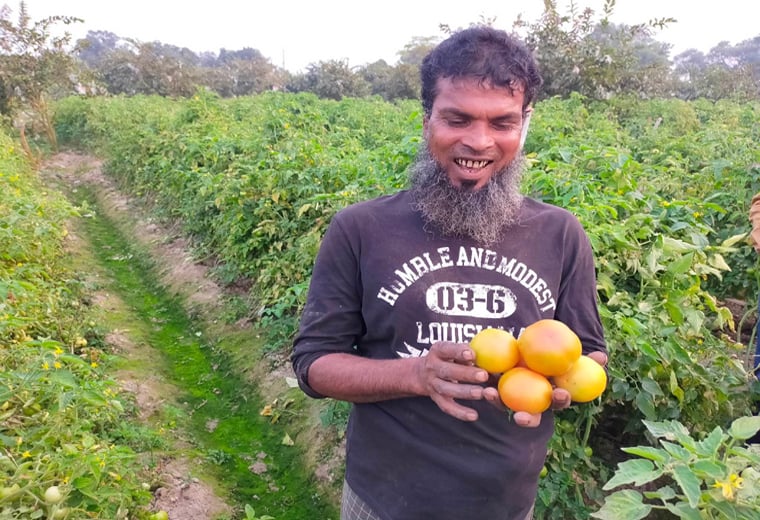
RAJSHAHI, Feb 22, 2023 (BSS)- Many of the grassroots farmers have changed their fortunes through vegetable farming after the best uses of eco-friendly techniques in the region, particularly the vast Barind tract, for the last couple of years.
Apart from improving their living and livelihood conditions and level of confidence, the growers are seen contributing a lot towards uplifting public health and environment through adopting the organic method.
Vegetable growers are seen humming towards safe as well as eco-friendly methods in varieties of winter and summer vegetables, including tomato, cauliflower, cabbage and brinjal, and elevating their fortunes.
Anarul Islam, 48, a farmer of Harishankerpur village under Godagari upazila, has become an icon in the field of earning lucrative money through producing and selling safe and hygienic tomatoes.
"I've already earned around Taka 12 lakh after selling 560 mounds of tomato during the current season," Islam said. He has cultivated the cash crop erecting stage on seven bighas of land after using the Integrated Pest Management (IPM) method.
Talking to BSS here Tuesday, he said there is no scope of harvesting immature tomatoes and using chemicals for ripening them. "We have learnt the technique of ripening in plants and selling matured tomatoes with stem," he added.
Both demand and market price of ripened tomatoes in plants are more compared to the conventional ones, encouraging and inspiring many others to follow the IPM method in vegetable farming.
Newly harvested tomato along with many other winter vegetables has made both the growers and consumers delighted as it has brought new taste and flavor.
Amirul Islam, another farmer of Uzanpara village under the same upazila, has sold 6,000 cauliflowers at Taka 1.5 lakh, while 5,500 pieces of cabbage at Taka 95,000 during the current season.
"I've cultivated cauliflower on 1.5 bigha of land and cabbage on one bigha of land through using mulching method," he said.
He has used organic fertilizer and different types of bio-pesticides, including sex pheromone trap and yellow trap, instead of chemical pesticide resulting in production of safe vegetables.
"I've learnt about the importance of bio-fertilizer, seed conservation and seed exchange," he said while talking to BSS at his house on Tuesday.
Fe has also learnt about the proper and sustainable use of land to protect its productivity.
He continued that his vegetables are chemical-free and most of the vegetables are sold from his field regularly. That's why he does not often need to take those vegetables to market for sale.
In a choked voice, he said that his previous life wasn't pleasant and he struggled to enhance his family income.
Nur Amin, a farmer of Diar Mohammadpur, has become financially solvent through brinjal farming after following the eco-friendly technique. "I've so far sold 50 mounds of brinjal at Taka 80,000," he said.
Currently, he can fulfil the nutrition demand of his family members by consuming chemical-free vegetables and milk and meat from domestic animals.
Being inspired by Amin's success, many other neighbours have started growing vegetables in their respective areas applying organic methods for the last couple of years.
Sub Assistant Agriculture Officer Atanu Sarker said massive changes have been brought into the cropping pattern through various time-fitting interventions to make the farmers fit for adapting to the adverse impact of climate change.
Godagari Upazila Agriculture Officer Moriam Ahmed told BSS that they imparted training on eco-friendly techniques to around 500 farmers, both male and female, through IPM Field School only in Matikata Union, for safe and hygienic vegetable production.
She said tomato farming appeared as a fortune changer for many farmers as it made many peasants solvent in the region this year while also significantly infusing dynamism into the local economy.
Many of the farmers have become self-reliant through tomato cultivation in the region.
Farmers have cultivated tomatoes on 3,050 hectares of land only in Godagari Upazila this year.
Shamsul Wadud, additional director of the Department of Agriculture Extension (DAE), said farmers have started growing chemical-free vegetables, using organic manure like vermin-compost, in the region including its vast Barind Tract.